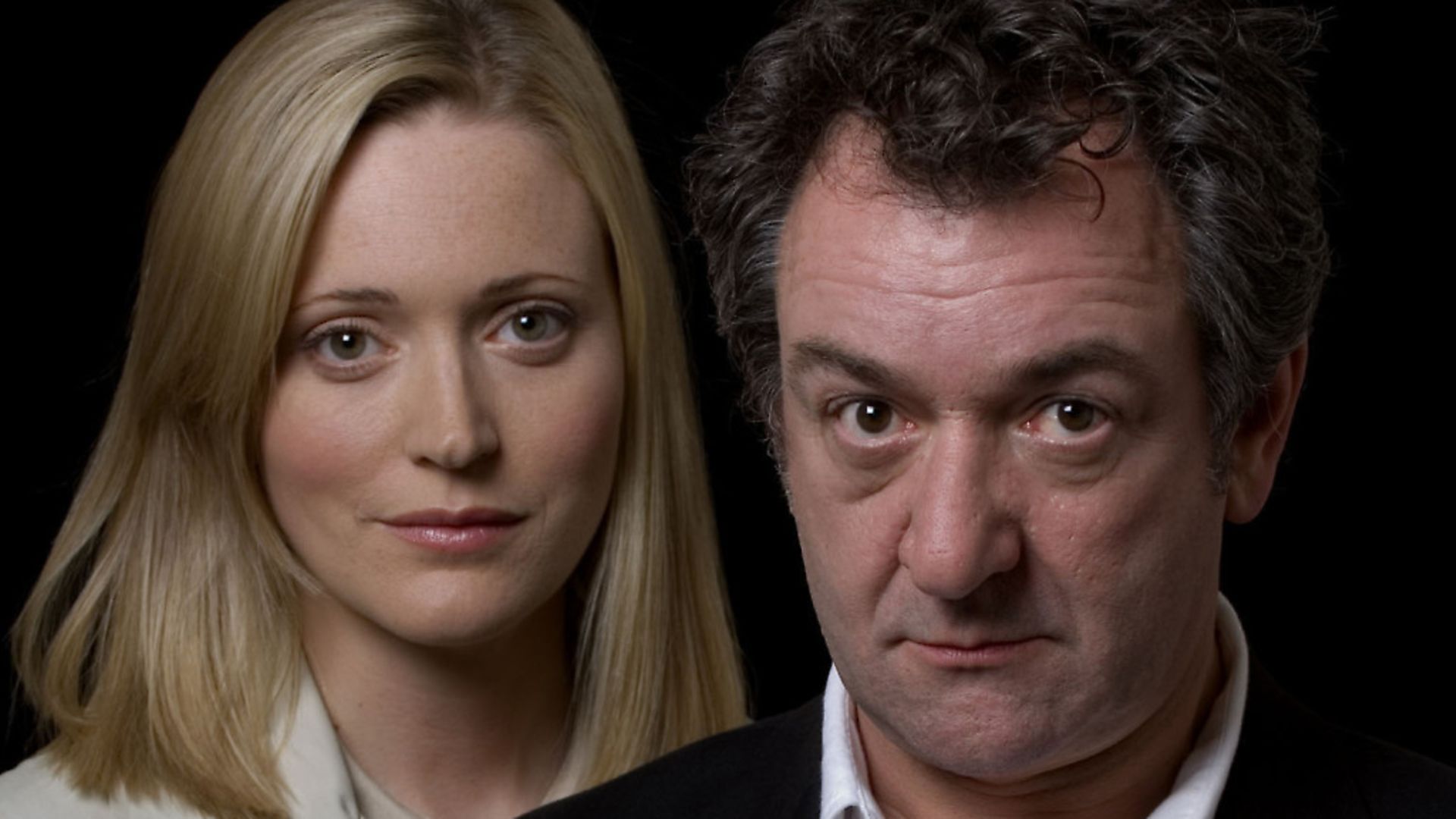
With Ian Rankin’s latest novel featuring the cop topping the bestseller charts, STEVE ANGLESEY asks why the Scottish sleuth has not found similar success on the screen

A rebus is a puzzle; a code in which letters and symbols denote words and phrases. John Rebus is a puzzle solver; the black-humoured, booze-soaked Edinburgh cop created by Ian Rankin, whose 22nd novel in the series recently entered the best-seller list at No.1. But Rebus is also a puzzle; a beloved character in the history of British crime fiction who, through bad luck and bad judgement, has somehow managed to resist a successful transition to the small screen.
Rankin’s Rebus books have sold more than 30 million copies worldwide, outstripping Peter Robinson’s Banks, RD Wingfield’s Frost and Colin Dexter’s Morse. Yet in the wider world beyond the book buyers currently poring over In A House Of Lies, those three are household names while Rebus decidedly is not. Just 14 TV episodes have been made, and none since 2007 – a stark contract with 32 for Banks, 42 for Frost and 55 for Morse (in original and Endeavour guises), all of whom continue to crack cases in ITV3 repeats.
Rankin’s ill-fortune with adaptations has even extended to the stage. The author was in attendance at Edinburgh’s Kings Theatre last month for the first night of new Rebus play Long Shadows, written by Rona Munro. Early in the second half, lead actor Charles Lawson stumbled over his lines and told the audience he was feeling faint; fellow cast members helped him off the stage and understudy Neil McKinven continued with script in hand. Lawson later revealed he had suffered a mini-stroke.
‘I find it slightly sad that it takes television or film to really bring something to the wider consciousness,’ says Henry Sutton, professor of creative writing and crime fiction at UEA, where Rankin was a visiting professor in 2016. ‘Adaptations are always a tricky thing. The great joy of reading is that everyone in their minds has a sense of who the character is, and where you see this character materialise on the screen it loses a certain bit of magic. Sometimes it works and sometimes it doesn’t. Sometimes, by and large, everyone is disappointed.’
Why should it be that Rebus has been outdone by his contemporaries on the small screen, and why does it matter? To take the second part first, it counts because of the quality of Rankin’s genre-transcending work. After a promising but uneven start with Knots And Crosses (1987), the plotting has grown sharper, the dialogue tauter, the characterisation deeper. Having first introduced us to Rebus as a Shakespeare-quoting ex-SAS man with a taste for jazz, Rankin gradually nailed his hero as an irascible, unsaveable, mordantly funny, rock music-obsessed curmudgeon now suffering from chronic obstructive pulmonary disease (‘trust you to get something with the word COP in it,’ says a character in In A House Of Lies, one of the series’ many excellent jokes). In each book we find him, in his creator’s words, ‘out there on some Edinburgh street, trying to make sense of the world and determined to endure.’
Supporting characters have grown richer too, most notably Rebus’ ambitious, process-driven English sidekick, whose role in recent novels has expanded to the extent that future versions of this article will probably wonder why we still do not have a definitive TV version of Siobhan Clarke. She arrived in The Black Book (1993), together with a first extended appearances for the gangster Big Ger Cafferty, becoming twin yins to the Rebus yang. By this time Rankin had established a pattern: one book a year, each more complex and confident.
With Black And Blue (1997), the series hit its imperial phase; a stunning run of 10 novels which ended when, having aged Rebus in real time, Rankin had to retire him at 60 in Exit Music (2007) before bringing him back as a civilian in 2012’s Standing In Another Man’s Grave.
Using the real-life, never-caught Scottish serial killer Bible John in Black And Blue suggested Rankin was about to follow the path trod by James Ellroy, whose fictional characters regularly collide with real ones, sometimes playing walk-on roles in key moments in American history. Instead, he headed towards territory occupied by US crime writers like Dennis Lehane and George Pelecanos, whose heroes are buffeted by waves of sociological change.
School shootings, police and parliamentary corruption, chequebook journalists, people-smugglers, internet voyeurs, paramilitary sectarian groups, paedophiles and immigrant-bashers have all featured in Rankin’s work, together with the damaged, the conflicted, the greedy, the venal and the insane (The author made a hilarious return to real-life events in 2005’s The Naming Of The Dead, in which Rebus accidentally causes George W Bush’s Segway fall at the 2005 Gleneagles G8 summit).
‘Ian views the detective novel as a brilliant way of capturing society at every level, because the detective has the opportunity to investigate everyone at all levels,’ says Henry Sutton. ‘He shifted the landscape to a degree; he came along at a time when crime fiction was not taken as seriously as it is now and he really embedded some serious social commentary and literary worth into the genre and did it in an effortless way.’
Rankin’s canvas is Edinburgh, with its imposing sandstone, its twisting alleys and windswept hills, a place of buried secrets, appearances to be kept up and historic grotesques like Burke and Hare. It’s a setting which in itself has become a character in the books.
So we have a compelling central character, a strong supporting cast, a photogenic set and a huge body of excellent source material. How on earth could such a combination have added up to less than the sum of its parts on TV?
The first actor to show an interest in playing Rebus was Leslie ‘Dirty Den’ Grantham – a piece of prospective casting to rival Whoopi Goldberg’s interest in playing the twentysomething Italian-American detective Angie Gennaro in Lehane’s Gone Baby Gone. Robbie Coltrane was briefly considered for a BBC adaptation before opting instead for Jimmy McGovern’s Cracker.
By the late 1990s, rights to the character were acquired by the Four Weddings And A Funeral actor John Hannah. He intended his friend Peter Mullan, hot from Ken Loach’s My Name Is Joe, to star but TV companies balked at having a relative unknown in the role. So Hannah, nearly 15 years younger than Rebus in the books, took the part himself.
His run of four two-hour episodes began with Black And Blue, screened in April 2000 and attracting more than seven million viewers (contemporary episodes of Morse and Frost were bringing in 13 and 12 million respectively). Hannah’s Rebus was suitably gloomy and graphic, but undone by strange choices – narration which left viewers with no incentive to think for themselves, the sidelining of Clarke’s character – and, ultimately, the lead’s youth.
Still, ITV might have persevered had an accident of history not intervened. Episode two, based on 1998’s The Hanging Garden, was screened on September 6, 2001, three days before the 9/11 attacks, and episode three (1999’s Dead Souls) followed four days after them, at a time when the appetite of viewers and broadcasters for dark material had diminished severely.
A fourth episode was postponed and not screened until November 2004, where only half a million watched its unheralded premiere on ITV3. By then, Hannah was long detached from the project.
A stocky, weatherbeaten Edinburgh native seven years Hannah’s senior, Ken Stott seemed a far more believable Rebus (the crime writer Mark Billingham once told Rankin he could imagine Stott nutting him, but not Hannah) and his first episode, loosely based on 2001’s superb The Falls, screened in January 2006 to an audience of more than nine million. But this reboot, with Claire Price more to the fore as Clarke after replacing Gayanne Potter, had its own problems; chiefly an uncertain lighter tone in both script and filming. And the seemingly perfect Stott turned out to be not quite so perfect after all, struggling to define himself in the role having only recently played very similar troubled detectives in The Vice (1999-2003) and Messiah (2001-05).
By September 2006 and the end of Stott’s second series, audiences had dwindled to under six million. ITV responded by cutting the running time of episodes in half for series four, meaning labyrinthine plots for Resurrection Men and The Naming Of The Dead were gutted to fit in effectively 45 minutes. For Rankin, it wasn’t ‘anywhere like long enough, so you were losing all the good stuff’. Stott found the season ‘really difficult’ and announced he would step down in favour of a younger man. But with under five million now watching, there was little clamour to try again.
And so Rebus the TV character followed Rebus the book character into retirement (although a much quieter one; In A House Of Lies is the fifth book since he officially left the force). In the meantime there have been successful radio plays, while on stage Lawson has won more plaudits than his history playing Coronation Street’s Jim ‘so it is’ McDonald might have suggested. But until recently it appeared that Rebus would join celebrated detectives like James Lee Burke’s Dave Robicheaux (21 novels over 31 years; two semi-satisfactory movies starring Alec Baldwin and Tommy Lee Jones) and Walter Mosley’s Easy Rawlins (14 books over 28 years; one impressive but commercially unsuccessful film starring Denzel Washington) in the realm of crime fiction’s great unadaptables.
That list once included Michael Connelly’s Harry Bosch (21 books over 26 years), but in 2014 Amazon launched a series with Titus Welliver in the title role of the tightly-wound Los Angeles detective. Each season compresses the events of two or three novels into 10 one-hour episodes, giving characters and plot lines room to breathe. After a shaky, scene-setting start it has become a commercial and critical success, with filming now underway on the fifth season.
Perhaps in response, the rights to Rebus were snapped up last year by Eleventh Hour, a production company whose credits include Safe House and Foyle’s War. Scottish playwright Gregory Burke is adapting for the BBC, and Rankin said recently ‘his notion is to do it over a few hours, to take one or two books, do a mash-up, but do it over six, eight, 10 hours’, which sounds very much like the Bosch pattern.
Still Rankin cautions, ‘Sometimes these things never happen. Let’s wait and see.’
For Henry Sutton, it simply doesn’t matter if we never see Rebus on screen again. ‘Look at Tom Cruise with Jack Reacher; those adaptations are not seen as successful but have they weakened Jack Reacher or not? No, because the books are more popular than the films. It’s the same with Rebus. I don’t think Ian is too concerned about it because he is concentrating on what he does best.’
In A House Of Lies by Ian Rankin is published by Orion
Warning: Illegal string offset 'link_id' in /mnt/storage/stage/www/wp-includes/bookmark.php on line 357
Notice: Trying to get property 'link_id' of non-object in /mnt/storage/stage/www/wp-includes/bookmark.php on line 37







